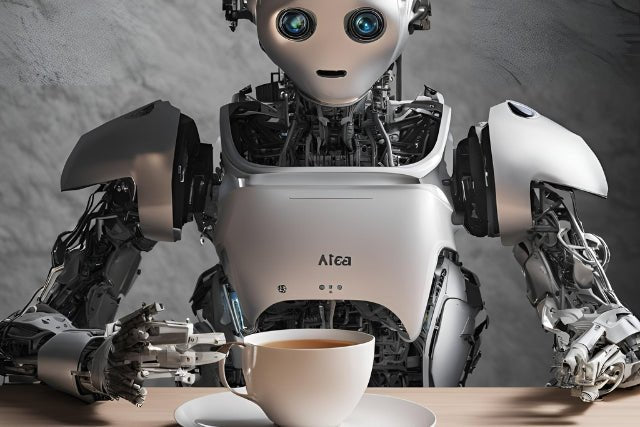

The tea industry, a traditional sector steeped in centuries-old practices, is undergoing a profound transformation. The catalyst? Artificial Intelligence (AI). This cutting-edge technology is reshaping various facets of the tea industry, from cultivation and production to marketing and sales. In this article, we delve into how AI is revolutionizing the tea industry, exploring real-world examples, current innovations, and future trends.
AI in Tea Cultivation

One of the most significant impacts of AI in the tea industry is evident in the cultivation stage. Tea plantations are vast, and monitoring them manually is a daunting task. AI-powered solutions are changing this by providing precise and efficient ways to manage tea gardens.
Precision Agriculture with AI
Precision agriculture involves using AI and other technologies to optimize field-level management regarding crop farming. In tea cultivation, AI-driven drones and sensors are becoming indispensable tools.
For example, in Assam, India, some tea estates have adopted AI-powered drones equipped with multispectral cameras. These drones fly over the plantations, capturing high-resolution images that help in monitoring plant health, detecting diseases, and assessing soil conditions. The data collected is analyzed using machine learning algorithms to provide actionable insights. This allows farmers to make informed decisions about irrigation, fertilization, and pest control, ultimately leading to healthier crops and higher yields.
Predictive Analytics for Yield Optimization
AI's ability to analyze vast amounts of data is revolutionizing yield prediction in tea farming. By integrating historical weather data, soil health records, and plant growth metrics, AI models can forecast yields with remarkable accuracy.
For instance, the Kenyan tea industry, one of the largest in the world, has seen the adoption of AI tools to predict tea yields. These tools analyze data from various sources, including satellite imagery and local weather stations, to provide farmers with precise yield forecasts. This helps in better planning and resource allocation, ensuring that farmers can maximize their productivity and profitability.
AI in Tea Processing

The journey from fresh tea leaves to the final product involves several intricate processes, including withering, rolling, fermenting, and drying. AI is playing a crucial role in optimizing these processes to enhance the quality and consistency of tea.
Quality Control through Machine Learning
Ensuring consistent quality is a significant challenge in tea processing. Traditionally, this has relied on the expertise of skilled tea tasters. However, AI is augmenting this process by providing objective and precise quality control mechanisms.
A notable example is the use of AI-powered optical sorting machines in tea factories. These machines use machine learning algorithms to analyze the colour, shape, and size of tea leaves, sorting them accordingly. This not only speeds up the sorting process but also ensures a higher degree of consistency and quality in the final product.
Fermentation Monitoring with AI
Fermentation is a critical stage in tea processing that significantly affects the flavour and aroma of the tea. Traditionally, this process has been monitored manually, which can be imprecise. AI is changing this by providing real-time monitoring and control.
In China, some tea factories have started using AI-powered sensors to monitor the fermentation process. These sensors measure parameters such as temperature, humidity, and gas composition, providing real-time data to a central system. Machine learning algorithms analyze this data to optimize the fermentation conditions, ensuring that each batch of tea achieves the desired flavour profile.
The Future of AI in the Tea Industry

As AI continues to evolve, its impact on the tea industry is expected to grow even further. Here are some future trends that could shape the industry in the coming years:
Advanced Robotics in Tea Plucking
While AI-powered drones and sensors are already making waves, the future could see the widespread adoption of advanced robotics for tea plucking. These robots, equipped with AI and machine vision, could navigate through tea gardens, plucking only the best leaves with precision and care. This would not only reduce labour costs but also ensure a higher quality of plucked leaves.
Blockchain and AI for Traceability
Consumers are increasingly demanding transparency and traceability in the products they consume. The integration of AI with blockchain technology could provide a robust solution for this. By combining AI-driven data analysis with blockchain's immutable ledger, tea companies could offer consumers detailed information about the journey of their tea, from the plantation to the cup. This would build trust and enhance brand loyalty.
Closing Thoughts

The integration of AI in the tea industry is more than a technological upgrade; it represents a fundamental shift towards efficiency, sustainability, and quality. By leveraging AI for precision agriculture, enhanced processing, and personalized marketing, the tea industry is poised to meet modern demands while preserving its rich heritage.
AI is not merely an addition to the tea industry's toolkit but a transformative force that ensures the industry's growth and resilience. Embracing AI innovations will be crucial for tea producers to remain competitive and sustainable in the future. The harmony of tradition and technology in the tea industry promises a bright future, where every cup reflects a blend of history and modernity.
